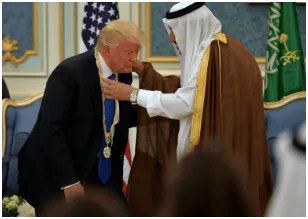Saudi Arabia’s Foreign Minister has arrived in Washington, D.C., to initiate high-level talks in preparation for U.S. President Donald Trump’s upcoming visit to the Kingdom—his first official overseas trip since beginning his second term in office.
The visit by the Saudi diplomat underscores the significance both nations place on maintaining and enhancing their long-standing strategic alliance. As preparations unfold, the diplomatic mission is focused on reinforcing bilateral ties, discussing regional security issues, and mapping out areas of collaboration that align with the renewed foreign policy goals of the Trump administration.
While specific details of President Trump’s visit remain under wraps, insiders suggest that the agenda will include a series of economic and security agreements, particularly in the fields of defense cooperation, energy, and counterterrorism. The Saudi Foreign Minister’s meetings with senior U.S. officials, including Secretary of State and members of the National Security Council, are aimed at finalizing key aspects of the trip, including ceremonial arrangements, security coordination, and joint statements expected to be issued during the visit.
President Trump‘s decision to select Saudi Arabia as the first stop in his post-reelection diplomatic outreach carries symbolic weight. It mirrors his first-term approach in 2017, when he made a historic visit to Riyadh as his first foreign destination, signaling the importance of U.S.–Saudi ties in shaping his administration’s Middle East policy. During that visit, Trump participated in a major summit with Arab and Muslim leaders and signed substantial arms deals, positioning the U.S. as a key partner in the region’s security architecture. The upcoming trip is expected to reaffirm and possibly expand on that foundation, despite changes in the regional landscape.
Sources familiar with the diplomatic talks suggest that one of the key topics on the table is regional stability, particularly in light of evolving dynamics in the Gulf and renewed tensions in conflict zones such as Yemen and the Red Sea corridor. Saudi Arabia is likely to push for increased U.S. engagement in security arrangements aimed at deterring Iranian influence and ensuring the safety of key maritime routes critical to global energy supplies. Discussions are also expected to touch on joint initiatives to counter extremism and foster technological cooperation, especially in areas such as cybersecurity, artificial intelligence, and clean energy.
The Saudi diplomat’s visit comes at a time when the Kingdom is pursuing an assertive foreign policy and broad economic reforms under its Vision 2030 plan. Key sectors such as tourism, entertainment, and renewable energy are being opened to foreign investment, and officials in Riyadh are keen to attract U.S. business and technology partners. Trump’s visit is likely to be used as a platform to announce new business deals or strategic partnerships that support this economic transformation while deepening American investment in the Kingdom’s non-oil economy.
Human rights and governance issues are expected to be approached cautiously. Although previous Trump administrations were known for prioritizing economic and strategic interests over human rights concerns, these topics may still surface during private discussions, particularly as global scrutiny of Saudi domestic policies continues. However, both sides appear to be focused on securing tangible outcomes from the visit that underscore shared interests and mutual benefit.
The timing of the visit is also notable against the backdrop of shifting global alliances and competition for influence in the Middle East. China and Russia have both made significant diplomatic and economic inroads in the region, often challenging U.S. dominance in spheres such as energy, infrastructure development, and arms sales. By renewing his diplomatic overtures to Riyadh early in his second term, President Trump aims to reassert American leadership in the region and reinforce Washington’s role as the partner of choice for Gulf states navigating a complex international environment.
Security coordination for the upcoming visit is reportedly a top priority for both nations. U.S. and Saudi intelligence services are working closely to ensure the safety of the trip, which is expected to involve meetings with King Salman and Crown Prince Mohammed bin Salman, as well as a broader summit with Gulf Cooperation Council (GCC) leaders. There is speculation that a high-profile regional security initiative or economic development fund may be unveiled during the visit, modeled on similar efforts from Trump’s first term.
Diplomatic analysts view the Foreign Minister’s visit as more than mere logistical groundwork—it is a signal of continuity and reaffirmation in a bilateral relationship that has withstood decades of geopolitical shifts, economic dependencies, and policy disagreements. The United States remains one of Saudi Arabia’s largest trading partners and a primary supplier of military equipment and expertise. In return, Riyadh offers Washington strategic access to one of the most geopolitically sensitive regions in the world, along with influence over global oil markets and an indispensable ally in counterterrorism efforts.
As anticipation builds around President Trump’s forthcoming visit, both countries appear intent on projecting strength, partnership, and strategic alignment. The Saudi Foreign Minister’s discussions in Washington are paving the way for what is expected to be a landmark diplomatic event—one that could shape the trajectory of U.S.–Saudi relations for the years to come. Whether the visit results in major policy announcements or serves primarily as a symbolic reaffirmation, its significance will not be lost on regional and global observers watching closely as the next chapter in the longstanding alliance unfolds.
Stay Connected: ”Your Source for the Latest News Updates“





